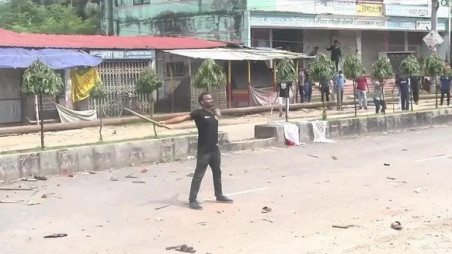ICT accepts charges, issues arrest warrants against 26 in Abu Sayed murder case
The tribunal has fixed 10 July as the next date of hearing. If the accused cannot be arrested by then, a public notice will be issued asking them to surrender. If they still fail to comply, the court will proceed with the trial by appointing state defence lawyers for them

The International Crimes Tribunal (ICT) has accepted formal charges and issued arrest warrants against 26 individuals in the murder case of Abu Sayed, a student of Begum Rokeya University in Rangpur.
Among those facing arrest warrants are former vice-chancellor of Begum Rokeya University (BRUR) Hasibur Rashid Bachchu and proctor Shariful Islam.
Justice Md Nazrul Islam Chowdhury of International Crimes Tribunal-2 issued the order today (30 June).
Abu Sayed was killed on 16 July last year during the protests led by Students Against Discrimination (SAD) in Rangpur.
Prosecutor Gazi MH Tamim confirmed that a total of 30 individuals have been named as accused in the case.
The prosecution team had submitted the formal charges before the International Crimes Tribunal-2, which the tribunal accepted during today's hearing.
Earlier, the investigation agency of the ICT submitted its report on the case, linking 30 individuals to the murder of Abu Sayed during the July uprising in Rangpur on 16 July.
Following the order, the tribunal directed the Inspector General of Police to arrest the 26 fugitives and produce them before the court by 10 July. The tribunal also showed four detainees as formally arrested in the case.
Speaking to reporters, Chief Prosecutor Mohammad Tazul Islam said, "The tribunal has fixed 10 July as the next date of hearing. If the accused cannot be arrested by then, a public notice will be issued asking them to surrender. If they still fail to comply, the court will proceed with the trial by appointing state defence lawyers for them."
He said Abu Sayed was "the first martyr of the July-August uprising," and added, "Law enforcement officers were directly involved in his killing. This constitutes a crime against humanity. The superior responsibility lies with the chain of command that ordered the use of lethal force - starting with Sheikh Hasina, passing through the home minister, the IGP, and eventually to senior police officers in Rangpur."
Tazul further alleged, "The Awami League, its student and youth wings, and the university authorities supported this crime against humanity. The BRUR administration not only aided the crackdown but also instructed police to suppress student protests. As they held superior positions, we have submitted charges against them for superior responsibility."
Earlier in the day, the prosecution formally filed charges in the Abu Sayed murder case, naming 30 individuals, including university officials, police personnel, and Chhatra League leaders.
Among them, four are currently in custody: Police Officer Amir Hossain, Constable Sujon Chandra, former BRUR proctor Shariful Islam, and BRUR Chhatra League Joint General Secretary Imran Chowdhury. Arrest warrants have been issued for the remaining 26.
The victim's family had lodged a formal complaint with the ICT on 13 January. The investigation found sufficient evidence to implicate all 30 individuals in the murder.
Abu Sayed was shot dead by police during a student protest in Rangpur on 16 July 2024, part of a nationwide movement against the government's controversial job quota system.
Video footage of Sayed being shot while standing with arms outstretched sparked national outrage and fuelled a wave of mass protests across the country.
The incident triggered a "complete shutdown" campaign nationwide and escalated into one of the largest uprisings in Bangladesh's history.
Despite the government imposing a curfew on 19 July, the situation spiralled beyond control.
On 5 August, the Sheikh Hasina-led Awami League government, in power for over 15 years, collapsed. Hasina reportedly fled to India with her sister Sheikh Rehana.
According to official records, nearly 1,400 people were killed and around 25,000 injured or permanently disabled during the protests.
Trials for those accused of perpetrating violence, including senior government officials and law enforcement officers, are now being pursued under the very tribunal initially established in 2010 by the Awami League government to prosecute 1971 war crimes.



 Keep updated, follow The Business Standard's Google news channel
Keep updated, follow The Business Standard's Google news channel















